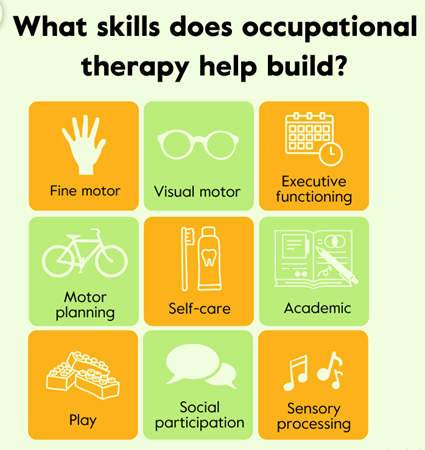Occupational Therapy
Occupational therapy (OT) is a branch of health care that helps people of all ages who have physical, sensory, or cognitive problems. OT can help them regain independence in all areas of their lives.
Occupational therapists address barriers impacting an individual’s emotional, social, and physical well-being. They take a holistic approach, seeking ways to support individuals in achieving the lives they aspire to lead.

Why do we need Occupational Therapy?
Occupational therapists collaborate with individuals of all ages to provide holistic support tailored to their unique needs and circumstances.
Occupational therapists assist individuals of all age groups in engaging effectively in diverse areas of life.
Occupational therapists can assist in various ways:
- Supporting students and teachers in classrooms to improve learning and success.
- Assessing and treating thinking difficulties after a stroke or brain injury in hospitals.
- Helping those with mental health issues learn skills for independent living.
- Helping people whose physical abilities have changed identify, acquire, and use equipment.
What are the roles of Occupational Therapy?
Occupational therapy adopts a comprehensive perspective, emphasizing the enhancement of independence and quality of life across an individual’s entire lifespan, rather than concentrating solely on specific areas.
OT helps a person develop the necessary skills to perform a task, and/or they may make the task/environment more accessible.
The roles of occupational therapy encompass:
- Assessment: Understanding the individual’s goals and identifying barriers to achieving them.
- Planning: Establishing short- and long-term treatment goals tailored to the individual’s needs.
- Implementation of Interventions: Teaching new techniques, providing adaptive equipment and resources, addressing environmental barriers, and facilitating skill development. FunWattle provides a range of resources that you can use to provide Occupational therapy not only to your child but any child requiring such support.
- Collaboration: Working closely with other healthcare professionals, families, caregivers, and relevant stakeholders to ensure comprehensive care and support.
By fulfilling these roles, occupational therapists empower individuals to overcome challenges and participate fully in activities that are meaningful and essential to their daily lives.

Strategies of Occupational Therapy:
Occupational therapy utilizes various strategies to help individuals improve their abilities.
- Activity-based interventions: These interventions involve engaging individuals in purposeful activities or tasks that are meaningful to them. The activities are chosen based on the individual’s interests, goals, and areas of need.
- Adaptive techniques: Adaptive techniques involve modifying tasks, environments, or equipment to make them more accessible and manageable for individuals with disabilities or limitations.
- Assistive technology: Assistive technology refers to devices, tools, or equipment designed to help individuals with disabilities or limitations perform tasks more effectively and independently.
- Environmental adaptations: Environmental adaptations involve modifying the physical environment to better meet the needs of individuals with disabilities or limitations. This may include making changes to the home, workplace, school, or community settings.
What are the advantages of Occupational Therapy?
Occupational therapy offers numerous advantages for individuals
- Developmental delays and/or behavioral difficulties in children
- Play and social skills
- Academic and cognitive skills
- Self-care routines
- Fine motor and handwriting skills
- Sensory processing disorder
- Independent functioning in activities (work, school, leisure, home, etc.)
- The person’s environment (evaluating and adapting)
- Adaptive equipment and care techniques
- Other issues surrounding the person’s ability to do the things that are important to them

Overall, occupational therapy offers a holistic and client-centered approach to addressing functional limitations, promoting independence, and improving the overall quality of life for individuals across the lifespan. While receiving occupational therapy from a certified therapist is valuable, supplementary interventions can further enhance developmental progress.
Hence, we encourage you to explore the occupational therapy resources offered by FunWattle, which can expedite the journey for your child or patient.

[…] Occupational therapists use play-based activities, exercises, and adaptive techniques to help children improve their motor skills, sensory processing abilities, and overall independence in daily tasks. Occupational Therapy […]